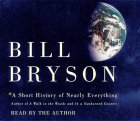A Short History of Nearly Everything, by Bill Bryson
Bill Bryson can always be counted on for taking his readers on memorable journeys, and his newest book is no exception. This time, however, the path Bryson travels is a different sort from the two-lane blacktops and woodland trails that have made him one of America's favorite writers. In A Short History of Nearly Everything, Bryson takes his readers on an unforgettable adventure into the annals of science and natural history. The audio book version, read by Bryson himself, is an especially enjoyable way to join Bryson on his odyssey through time.
One of the most striking and ultimately rewarding aspects of A Short History of Nearly Everything is the decidedly non-linear approach Bryson takes in telling the history of the world. Rather than starting "at the beginning" and recounting historical events along a traditional textbook time line, Bryson leads his readers on a wild armchair adventure leaping years, generations, and even epochs at will as he skillfully spins out explanations and innovations that were often unrealized or overlooked at the time of their discovery. For instance, he describes efforts to eliminate disruptive static on a long-range solar telescope. This accidentally led to a new understanding of the "Big Bang" theory of the origin of the Universe.
Bryson has an uncanny ability to take the most arcane scientific theories and beliefs and transform then into real world common sense. I wish I could have read this book when I was struggling with university science classes. Bryson accomplished in about an hour's worth of CD play what two years of college physics failed to deliver—a basic understanding of Einstein's relativity and quantum theories. Likewise, his treatment of Darwin's theory of evolution and its strained relationship to the current understanding about the rise of man from a common ancestor is compelling and fascinating. Some of Bryson's revelations are also chilling, like the behavior and longevity of bacteria and viruses. His handling of the concept of the creation of life, with all of its implications, is especially riveting.
An entertaining aspect of this book is that it dispels the notion that anything resembling "pure science" has ever existed or is even possible. Scientific advances and the evolution of ideas occur along with and often in spite of the same petty infighting, professional jealousy, and flaming egos that characterize the rest of human endeavors. Bryson's book shares a wealth of little known facts and anecdotes. Did you know that Madame Curie's home cookbooks are still dangerously radioactive, or that Einstein worked as a Swiss patent office clerk who couldn't get promoted?
In A Short History of Nearly Everything,
Bryson succeeds in creating a framework from which one can
view the entire history of the Universe. It's like being in
the center of a vast, clear, transparent onion. With Bryson
as tour guide, the context in which scientific discoveries
were made becomes clear, and it's easy to see how all of the
various disciplines and cultural evolutions fit together.
Although this book has a decidedly "Western" bias,
it encourages readers to reexamine commonly held notions of
natural history and the place of humans within it. It is truly
a delight, and I found the six hours that Bryson read his
book to me flew by at the speed of light—relatively speaking,
of course.
Mark
Sedenquist
9/21/03

